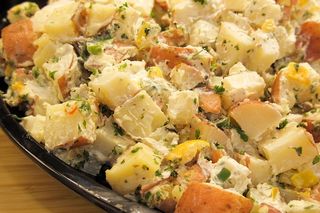Health
Beating the Warm Weather Weight Gain
Learn how to get through BBQ season without comprising your health
Posted May 20, 2016
Now that the weather is getting warmer, and the rain has died down, you’ll most likely start to attend a lot more BBQs. This may partially explain why several studies have found that some people actually GAIN weight in the spring and summer, compared to the colder months1,2. This is likely surprising because many people think the opposite. In the winter, it’s easy to forgo the early morning run or the drive to the gym because it’s so cold and dark out- and don’t forget the holiday parties loaded with calorically dense treats! But, in reality, the summer months can be tricky to get through without gaining extra weight. Although some blame the lazy hot summer days, in reality, the constant hot dogs and hamburgers probably do more dietary damage. But don’t worry- BBQs usually have foods that you can still enjoy while sticking to your diet, it’s just important to avoid the ones that derail all your hard work. So, since it’s still early in the season, now’s the perfect time to discuss ways to mitigate the weight gain that comes along with outdoor festivities in the Spring and Summer months.
Don’t stand around the food
If you’re not the one grilling or cooking, grab a seat at the table (or lounge chair) to catch up with friends, but chose a seat turned away from the food table or grill. The visibility of food influences the start of the meal, the length of the meal and the total portion consumed. One study showed that when participants where blindfolded, their intake decreased by 22%, with no differences in satiety3. Obviously you’re not going to blindfold yourself at a BBQ, but taking a seat away from the food may just do the trick. Since the food at BBQs are typically left out and visible for a couple of hours, you are going to be tempted to keep eating for many of those hours too. Once you figure out where you’re going to sit, grab someone you don't really know or haven’t seen in ages- chances are you’ll eat less than if you’re sitting with someone you always hang out with. Now, picking the food you’re going to fill your plate with is the next step.
Mind Your Meat

Meat is a great source of protein, iron and vitamin B12, however depending on the cut, type, portion or sauce it’s slathered in, it can also be hazardous to your health. First things first- if you’re deciding what you want grilled, avoid the process or cured meats. These include hot dogs, sausages and kielbasa. All these foods have added preservatives like nitrates and salt, in addition to whatever else is ground up (usually additional fat and starchy fillers) into a casing. Not only are these foods not lean, they have also been associated with cancer and heart disease. So what should you pick instead? Fish on the grill is usually not as common as sausage links or franks, but if available that would be one of the healthiest choices. Veggie and black bean burgers are great meat alternative too, plus besides the fiber and protein, black beans have over 5 different flavonoids! But, if not, aim for a grilled piece of chicken breast or lean cuts of steak like sirloin tip or flank. Don’t be fooled by turkey burgers, unless the turkey meat is made from ground turkey breast, it may have almost as much fat as a beef hamburger. Still really craving that hot dog? Keep in mind that a regular hot dog can run you upwards of 200 calories and 15 grams of fat- and that’s without the beans and bun, so make sure to go easy on the sides dishes.
Watch Your Starch and Sugar
When you think grills, bread and sugar usually aren’t the first things that come to mind- but maybe it should be. Let’s face it- hamburgers and hot dogs are just better with buns. A low sugar alternative is having your burger in a lettuce “wrap,” but it usually doesn't do the trick. So, if you chose to have a bun with your burger, remember that is like eating 2 slices of bread (~30 grams of low fiber/quick digesting carbohydrates, with some added sugar for taste of course!) so go lighter on the starchy sides or condiments. BBQ sauce and ketchup should be the first two condiments that come to mind that are loaded with sugar- 1 Tbsp (about the tip of your thumb tip) of BBQ provides ~ 7 grams of sugar and ketchup isn’t too far behind with 4 grams. So with the added condiments, your high protein hamburger just became a vehicle for sugar. Try mustard instead (0g of sugar!) or add a slice of tomato and red onion for a naturally sweet taste.

Be sure to steer clear of the white gloopy potato and macaroni salads- they are loaded with fat from the mayo and packed full of quick digesting carbohydrates, both providing about 400 calories and 20 grams of fat per cup. Although cold potatoes do contain fiber and resistance starch, which is associated with increased feelings of fullness 4, a healthier option is a German-style potato salad due to its vinegar base. This saves you hundreds of calories from mayo. If no other starchy side dishes except baked beans are available- although these have extra sugar (from the “maple” flavor) and fat (usually from the pork chunks), baked beans are still a healthier option than mayo laden potato or macaroni salad. Serving for serving, they provide less calories and fat, and more potassium, iron and fiber, making it a better choice.
Fill half your plate with veggies
The USDA’s dietary recommendation based off of My Plate doesn’t change because it’s a BBQ! Keep filling half your plate with non- starchy vegetables AKA NOT peas, corn or potatoes. Try some grilled vegetable kebabs with peppers and onions. If there’s a bowl of salad- fill up! But, if the only vegetable you see is corn on the cob- split half with a friend and avoid the butter. Summer corn is sweeter and taste great on its own without the added calories. If you know in advance what the menu is going to be, offer to be the one to bring a side dish of vegetables- marinate some squash and through them on the grill along side the meat. Another option that is always welcome (and usually a crowd pleaser) is crudité with hummus- the snack table shouldn’t only be decorated with chips and dip.
Now that your plate is made, beware of the drinks. Stay away from all sugar sweetened beverages, including lemonade and ice tea. Just one cup of those beverages delivers about 5 packets worth of sugar, and most people drink more than 8 oz. Opt for water or seltzer when possible, especially if you’re planning on having alcohol. If you chose to have a drink or two, make sure to alternate between alcohol and water- not only will this help keep you hydrated, it will save you calories and sugar. If red wine sangria is an option, make sure you add in lots of fruit, it will take up space in your cup while giving you a healthy dose of vitamins and minerals. Plus the red wine has a lot more antioxidants than frozen daiquiris and beer. Just don't forget portion sizes- 1 drink is 1.5 oz of hard liquor, 5 oz of wine (that’s only a little more than ½ cup!) or 12 oz of beer. When sugary mixers get added, one drink can be over 200 calories, and you didn't even get to dessert yet.
Most people know desserts have lots of calories in them, so instead of telling you what to avoid, lets discuss what to look for. Fresh fruit salad with a dollop of whipped cream (if necessary) is usually always an option at a BBQ. 1 cup of fruit salad is only ~ 60 calories and 15 g of sugar, and in general fruit is a good source of potassium, which can help counteract the water retaining salt from the chips and hot dogs. Grab a slice of watermelon, its fun to eat and no BBQ is complete without it. Craving something cold? Frozen fruit bars are a decent choice, even though they usually have a lot of sugar, these bars have a lot less calories than ice cream cake or chocolate cream pie, making it a lighter option.
Now that BBQ season is among us, remember these tricks and tips to prevent the dreaded summer time weight gain.
Reference:
1. Moreno JP, Johnston CA, Chen TA, et al. Seasonal variability in weight change during elementary school. Obesity. 2015;23(2):422-428.
2. Hull HR, Morrow ML, Heesch KC, Dinger MK, Han JL, Fields DA. Effect of the summer months on body weight and composition in college women. J Womens Health (Larchmt). 2007;16(10):1510-1515.
3. Linne Y, Barkeling B, Rossner S, Rooth P. Vision and eating behavior. Obes. Res. 2002;10(2):92-95.
4. Higgins JA. Resistant starch: metabolic effects and potential health benefits. J. AOAC Int. 2004;87(3):761-768.
Appreciation is extended to Kristen Criscitelli for drafting this post
Dr. Nicole Avena is a research neuroscientist, author and expert in the fields of nutrition, diet and addiction. She received a Ph.D. in Neuroscience and Psychology from Princeton University, followed by a postdoctoral fellowship in molecular biology at The Rockefeller University in New York City. She has published over 70 scholarly journal articles, as well as several book chapters and books, on topics related to food, addiction, obesity and eating disorders. She also edited the books, Animal Models of Eating Disorders (2012) and Hedonic Eating (2015), coauthored the popular book of food and addiction called Why Diets Fail (Ten Speed Press), and recently finished her new book, What to Eat When You're Pregnant. Her research achievements have been honored by awards from several groups including the New York Academy of Sciences, the American Psychological Association, the National Institute on Drug Abuse, and her research has been funded by the National Institutes of Health (NIH) and National Eating Disorders Association.
Website: http://www.drnicoleavena.com
Twitter: https://twitter.com/DrNicoleAvena/
Facebook: https://www.facebook.com/DrNicoleAvena




